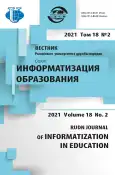Цифровая дидактика как дисциплина программы магистерской подготовки
- Авторы: Глизбург В.И.1
-
Учреждения:
- Московский городской педагогический университет
- Выпуск: Том 18, № 2 (2021)
- Страницы: 180-187
- Раздел: ИННОВАЦИОННЫЕ ПЕДАГОГИЧЕСКИЕ ТЕХНОЛОГИИ В ОБРАЗОВАНИИ
- URL: https://journal-vniispk.ru/2312-8631/article/view/321231
- DOI: https://doi.org/10.22363/2312-8631-2021-18-2-180-187
- ID: 321231
Цитировать
Полный текст
Аннотация
Проблема и цель. Проблема заключается в результативности формирования у субъектов образовательного процесса мотивации к продуктивной информационной деятельности. Цель определяется необходимостью подготовки специалистов с учетом изменений в сфере образования, произошедших в связи с внедрением в учебный процесс цифровых технологий, и рисков цифровизации, порожденных техногенными процессами в образовательной среде. Методология. Использовались авторские программы и фонды оценочных средств, разработанные практические задания и темы исследовательских проектов для включения их в программы педагогической и производственной практик магистрантов. Материалы основаны на авторских разработках, отраженных в учебных пособиях. В практике реализации дисциплины нашли методологическое обоснование следующие технологии: информационно-коммуникационные универсального назначения, Big Data, дистанционное обучение, смешанное обучение, организации проектной деятельности обучающихся. Результаты. Внедрение дисциплины «Цифровая дидактика» позволяет сформировать у магистрантов новые компетенции. Заключение. Компетенции, сформированные при обучении дисциплине «Цифровая дидактика», дают возможность учесть существующие изменения в сфере образования.
Ключевые слова
Об авторах
Вита Иммануиловна Глизбург
Московский городской педагогический университет
Автор, ответственный за переписку.
Email: glizburg@mail.ru
ORCID iD: 0000-0003-1230-6931
доктор педагогических наук, кандидат физико-математических наук, профессор, департамент методики обучения, Институт педагогики и психологии образования
Российская Федерация, 129226, Москва, 2-й Сельскохозяйственный пр-д, д. 4Список литературы
- Atanasyan LS, Glizburg VI. Collection of problems in geometry: textbook. M.: EKSMO Publ.; 2007. (In Russ.)
- Aksenova MV, Vinogradova EP, Viranovskaya EV, Glizburg VI et al. Quality management in professional education: collective monograph. Orenburg; 2012. (In Russ.)
- Glizburg VI. Professional training of masters of pedagogical education to integrated training of schoolchildren. Bulletin of the Moscow City Pedagogical University. Series: Pedagogy and Psychology. 2015;1(31):27–32. (In Russ.)
- Glizburg VI. Preparation of masters of pedagogical education for integrated teaching of schoolchildren in mathematics and computer science. RUDN Journal of Informatization in Education. 2019:16(4):318–327. (In Russ.)
- Grigoryev SG, Grinshkun VV. Training of masters in the program “Information Technologies in Education” at MSPU – a new direction, new opportunities. Bulletin of Peoples’ Friendship University of Russia. Series: Informatization of Education. 2013;(2): 5–13. (In Russ.)
- Monakhov VM, Tikhomirov SA. Evolution of the methodological system of e-learning. Yaroslavl Pedagogical Bulletin. 2018;6(105):76–88. (In Russ.)
- Glizburg VI. Application of information technologies in the process of teaching differential geometry. Bulletin of Peoples’ Friendship University of Russia. Series: Informatization of Education. 2009;(1):34–38. (In Russ.)
- Glizburg VI. Information technologies in the development of topological and differential-geometric knowledge in the conditions of continuous mathematical education. Informatics and Education. 2009;(2):122–124. (In Russ.)
- Glizburg VI. Elective study of topology in senior classes of secondary school as an element of unity of continuous mathematical education and propaedeutics of its study in higher education. Math at School. 2008;(9):57–61. (In Russ.)
- Glizburg VI. Informatization of education as a factor of integration of primary education in mathematics and informatics. Bulletin of Peoples’ Friendship University of Russia. Series: Informatization of Education. 2013;(1):76–81. (In Russ.)
- Danilyuk AYa, Faktorovich AA. Digital general education. Moscow: Avtorskaya masterskaya Publ.; 2019. (In Russ.)
- Kornilov VS. The role of computer science courses in teaching university students numerical methods. Bulletin of Peoples’ Friendship University of Russia. Series: Informatization of Education. 2011;(3):24–27. (In Russ.)
- Bidaibekov EY, Kornilov VS, Kamalova GB. Training of future teachers of mathematics and computer science to inverse problems for differential equations. Bulletin of the Moscow City Pedagogical University. Series: Informatics and Informatization of Education. 2014:3(29):57–69. (In Russ.)
- Kornilov VS. Inverse problems in the academic disciplines of applied mathematics. Bulletin of the Moscow City Pedagogical University. Series: Informatics and Informatization of Education. 2014;1(27):60–68. (In Russ.)
- Glizburg VI. Algorithmization of the schoolboy's mental activity in preparation for solving GIA problems. Math at School. 2012;(8):59–62. (In Russ.)
- Kornilov VS, Morozova SV. Experimental pedagogical activity when teaching computer science to younger students. RUDN Journal of Informatization in Education. 2020;17(1):18–25.
Дополнительные файлы









